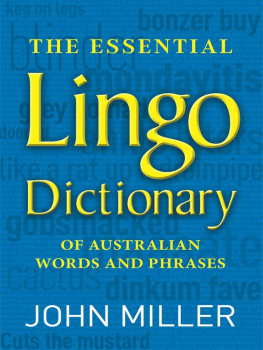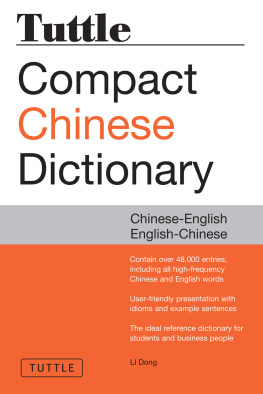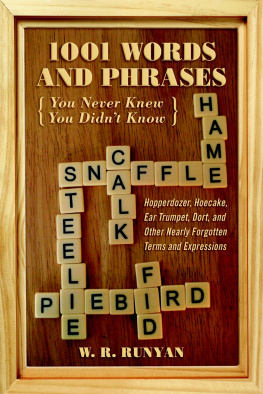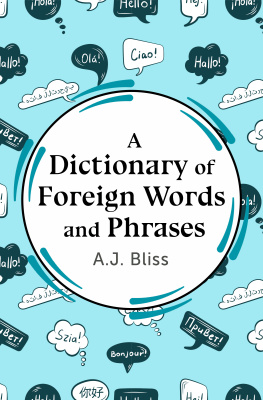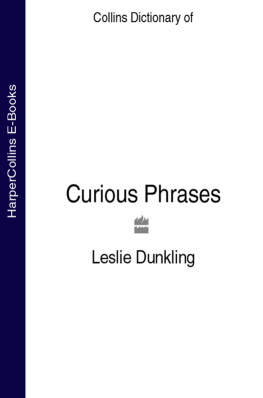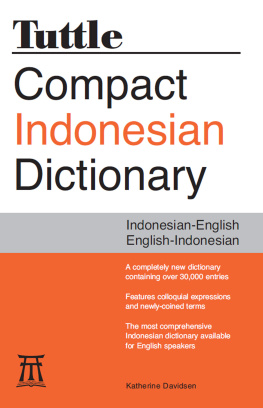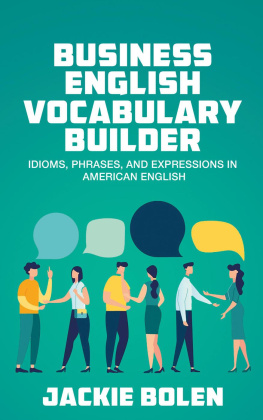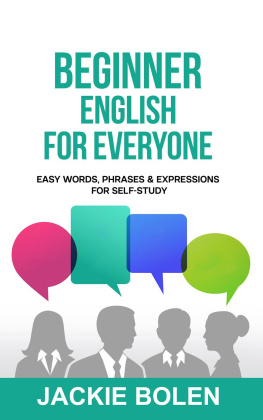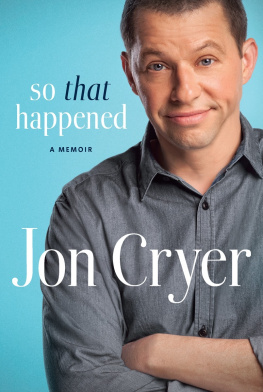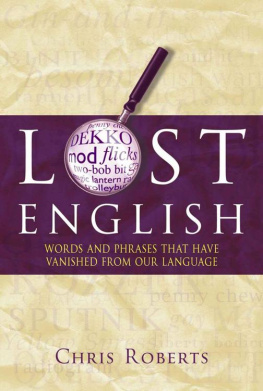Max Cryer - Curious English Words and Phrases: THE TRUTH behind the expressions we use
Here you can read online Max Cryer - Curious English Words and Phrases: THE TRUTH behind the expressions we use full text of the book (entire story) in english for free. Download pdf and epub, get meaning, cover and reviews about this ebook. year: 2009, publisher: Exisle Publishing Pty Ltd, genre: Religion. Description of the work, (preface) as well as reviews are available. Best literature library LitArk.com created for fans of good reading and offers a wide selection of genres:
Romance novel
Science fiction
Adventure
Detective
Science
History
Home and family
Prose
Art
Politics
Computer
Non-fiction
Religion
Business
Children
Humor
Choose a favorite category and find really read worthwhile books. Enjoy immersion in the world of imagination, feel the emotions of the characters or learn something new for yourself, make an fascinating discovery.

Curious English Words and Phrases: THE TRUTH behind the expressions we use: summary, description and annotation
We offer to read an annotation, description, summary or preface (depends on what the author of the book "Curious English Words and Phrases: THE TRUTH behind the expressions we use" wrote himself). If you haven't found the necessary information about the book — write in the comments, we will try to find it.
Max Cryer: author's other books
Who wrote Curious English Words and Phrases: THE TRUTH behind the expressions we use? Find out the surname, the name of the author of the book and a list of all author's works by series.
Curious English Words and Phrases: THE TRUTH behind the expressions we use — read online for free the complete book (whole text) full work
Below is the text of the book, divided by pages. System saving the place of the last page read, allows you to conveniently read the book "Curious English Words and Phrases: THE TRUTH behind the expressions we use" online for free, without having to search again every time where you left off. Put a bookmark, and you can go to the page where you finished reading at any time.
Font size:
Interval:
Bookmark:
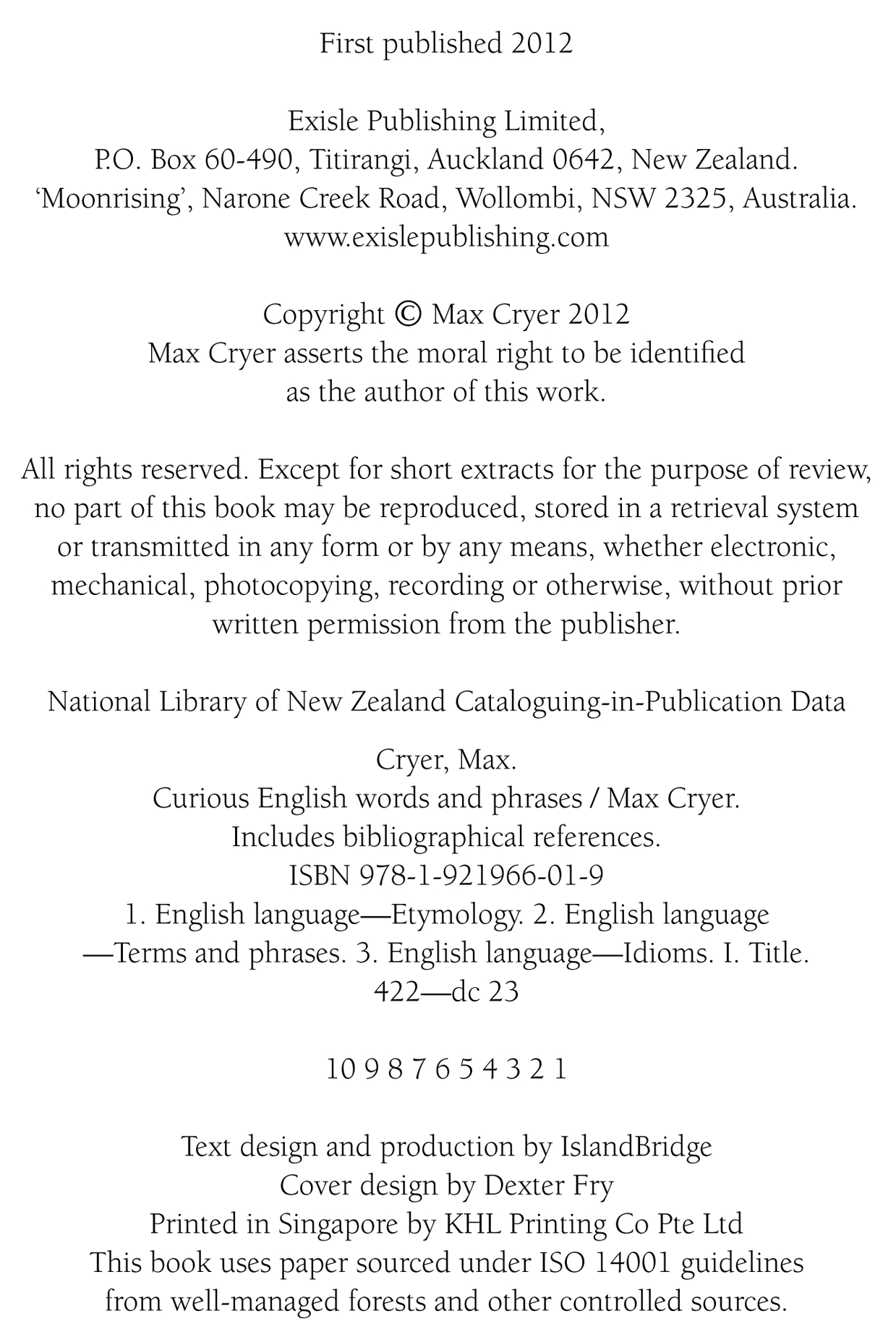
The author thanks Graeme and Valerie Fisher, Robbie Ancell, Geoffrey Pooch, Graeme Hill, Emma Sloman, Paul Barrett and Ian Watt for their assistance in the preparation of this book.
It is possible (if admittedly fanciful) to envisage the English language as being like a vast and ancient city magnificent and full of interest, but at the same time shambolic. It has been subject to suburban sprawl, has constantly added new edifices, upgraded heritage precincts in some quarters, demolished them in others, and has complex roading systems freely negotiable only by those who have long lived in that area.
And the city has wrenched benefits from other civilisations by shamelessly raping, pillaging and outright thieving from them words, images, expressions and proverbs. No other language has been safe from the grasp of this great conurbation known as English: Sanskrit, Hindustani, Arabic, Turkish, Russian, Japanese can be found in its small winding alleys besides, on the main streets, the more expected Latin, Dutch, German, French, Spanish, Swedish and Russian (more expected because Britain is only 35 kilometres from the Continent at the closest point).
Noel Cowards character Countess Mitzi is an aristocrat with a complex ancestry. She sings:
Like her, our language is something of a polyglot it is an entity made up from many different tongues. And there are many people who want to know the which, the where and the why of it. I hope to provide at least some of the answers.
Max Cryer
Many people can recognise and give the name for a question mark, an ampersand, a hash sign, an asterisk, a colon, a chevron, a slash. But the @ or squiggly at is not so easy to pin down.
Italian academics claim that the symbol has been around since at least the 1500s. In those days it had a strong position in commerce, because grains and liquids were transported in jars which held a strictly measured amount. The jars were called amphorae, so the single letter a signified goods to the weight or volume of one amphora jar, and the a was written with an Italian flourish.
The sign settled to mean at the price of and was used that way in Europe for centuries, e.g. 3 metres of lace @ 500 lire per metre.
The @ sign took a while to get onto typewriter keyboards, but it was there by 1880 and by the 1960s it began to be carried over to computers. In 1972 the symbol was chosen to be the separator in email addresses and it has been so successful that even languages like Tamil and Japanese and Arabic have taken it on board even though they dont use Latin alphabet letters.
But it still isnt clear-cut what to call it. Most languages have their own version: the Germans call it spider monkey, the Danes, Norwegians and Swedes alternate between calling it pigs tail or elephants trunk. The Finns call it a cats tail and in Hungary its a worm. In Israel its called strudel, the French, Italians and Koreans call it a snail and in the Czech Republic its a word meaning rolled-up herring. The Greeks call it little duck and the Russians call it little dog.
Initially, electronic messages could only be sent between users of the same computer network. American technologist Ray Tomlinson devised a way of sending messages to users of other computers but needed an address which was neither a recognisable letter nor a number. He examined a keyboard, and settled on the @ symbol to separate the name of the user from the domain identity. He sent the first message, in what is now known as email, in 1972 and the @ symbol took on a whole new life.
There are no rules about its name. English has turned out to be the most colourless no elephants or rolled herrings or curly-tailed monkeys. In English it is just called commercial at, or curly at.
Action figures is a name used to market dolls for boys.
There is no clear answer to this. The only clue is that in the English language, Latin and Greek expressions occur frequently (like Anno Domini and kilometre) and are sometimes mixed up with English-based expressions.
The expression Anno Domini dates from the days of Dionysius Exiguus, who in the sixth century more or less invented the basis of our current calendar. He got it about four years wrong, but its understandable that Jesus was commemorated with a Latin phrase, Anno Domini, because it was the Roman emperor who asked for the job to be done.
The idea of referring to years before Jesus was born is much more recent. The first generally known reference to a scale of time before Jesus didnt surface until the seventeenth century, and didnt become common until the eighteenth century. And heres the rub: whereas AD seemed to stick in Latin, other languages made up their own versions of the time before Jesus. Germans refer to it as VC (vor Christus) and the French call it AvJC (avant Jesus Christ), while English speakers use BC Before Christ.
And since there are other major religions which dont attribute the same significance to Jesus, outside Christian circles youll come across CE Common Era, and BCE Before Common Era.
Adult and adultery have two slightly different paths of development: adult is from the Latin meaning a grown-up person, but adultery is believed to come from another Latin origin, alter, meaning to debase or render impure. When that word went into French as avouter it developed the meaning to stain or defile.
Avouter drifted into English as adultery and by the time Shakespeare used the word, it carried the French sense of a blot, a stain, or something extra which is not pure, as adulterate still does milk adulterated with water.
Eventually adultery came to mean anything spurious or counterfeit, including sex between a married person and a partner other than the legal spouse. Now its use seems to be confined to that sense only.
Exercising to music (which is basically what aerobics describes) has been going on for centuries. The activity now called aerobics is the descendant of what used to be called PT (physical training) or sometimes PE (physical exercise). Once upon a time it was called eurhythmics. However, although the activity itself was not dissimilar, that name seems to have been discarded because it had an overly feminine image (and eurhythmics somehow doesnt sound as if the participants enjoyed endorphin highs).
The word aerobics was first published in 1968 in a book by Kenneth Cooper, a former military flight surgeon, who created the fitness regime and the name to go with it. The word is made up from the Greek aer meaning air, plus Greek bios, meaning life. Together they give the clue to what makes aerobics slightly different from all the other exercise forms the process aims to increase oxygen in the blood. The routines are not static: you have to keep moving (and to be fashionable, give out falsetto yips as well).
The associated terms jazzergetics, stretchomatics and limbercize, all mean much the same.
These are examples of toponymy the naming of things after places. Bikinis, denim, currants, tangerines, mayonnaise, camembert, tweed, jodhpurs, muslin, dollars and spaghetti bolognaise are all named after places (note, however, that turkeys dont come from Turkey and guinea pigs dont come from Guinea).
Font size:
Interval:
Bookmark:
Similar books «Curious English Words and Phrases: THE TRUTH behind the expressions we use»
Look at similar books to Curious English Words and Phrases: THE TRUTH behind the expressions we use. We have selected literature similar in name and meaning in the hope of providing readers with more options to find new, interesting, not yet read works.
Discussion, reviews of the book Curious English Words and Phrases: THE TRUTH behind the expressions we use and just readers' own opinions. Leave your comments, write what you think about the work, its meaning or the main characters. Specify what exactly you liked and what you didn't like, and why you think so.

